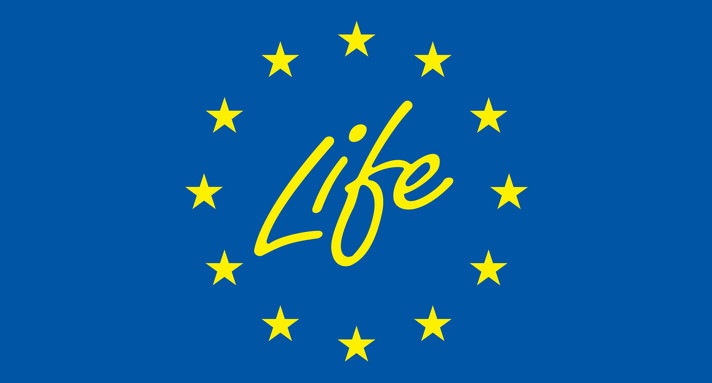With the LIFE program (L'Instrument Financier pour l'Environnement) the European Commission promotes the further development and implementation of the European Union's (EU) environmental, nature conservation, energy and climate policies. Since 1992, over 5,500 projects have been funded across Europe (LIFE project database).
With the approval of the European Union Parliament, the new LIFE Regulation 2021-2027 was adopted on April 29, 2021.
According to Article 3, the general objective of the LIFE program is to:
- "contribute to a just transition towards a sustainable, circular, energy efficient, renewable energy-based, climate-neutral and -resilient economy,
- to protect, restore and improve the quality of the environment, including the air, water and soil, and of health,
- and to halting and reversing biodiversity loss, including by supporting the implementation and management of the Natura 2000 network and tackling the degradation of ecosystems.
and thus contribute to sustainable development overall".
The new LIFE program has been allocated a total budget of €5.43 billion. The new program period does not contain any significant changes in terms of content, but the Energy Transition subprogram has been newly included. This was part of the EU's Horizon 2020 research and innovation program until the end of 2020.
Which topics does LIFE support?
The new LIFE program is divided into two areas: "Environment" and "Climate Policy". The objectives for the new funding period are implemented in four subprograms:
Environment:
- Nature and Biodiversity
- Circular Economy and Quality of Life
Climate Policy:
- Climate Change Mitigation and Adaptation
- Clean Energy Transition
What are the funding volumes?
In July 2021, the new multiannual Work Program 2021 - 2024 was published, with a budget of €1.801 billion for the environment sector and €1.032 billion for the climate policy sector.
The LIFE program offers eligible projects a grant from the European Union. Co-funding from the European Union is usually 60 percent but can be up to 75 percent for the "Nature Conservation and Biodiversity" subprogram and up to 95 percent for the "Energy Transition" subprogram.
Funding is applied for online via the European Commission's Funding & Tender Opportunities Portal, which usually issues calls for project applications once a year.
Who can participate?
Both public and private institutions from all EU Member States can participate in the LIFE program (for example, administrative authorities, non-governmental organizations, profit and non-profit institutions). There is no obligation for project leaders to involve European partner institutions. However, the EU explicitly wants to encourage joint European projects and for this reason awards additional evaluation points for transnational partner consortia.
Further information and instructions for submitting applications
For anticipated deadlines for submitting applications in the current year, up-to-date information and additional documents, please visit the LIFE website of the European Commission - Directorate-General for the Environment.
Comprehensive information on the LIFE program can also be found on the website of the nationwide LIFE advisory service of Zukunft Umwelt Gesellschaft (German).
The Ministry for Environment, Climate and Energy Sector asks the applicant for early information in case of a planned application.
Info days on the EU LIFE call for proposals 2024
The new calls for proposals for all LIFE sub-programs were published on April 18, 2024:
- Nature Conservation and Biodiversity (NAT)
- Circular economy and quality of life (ENV)
- Climate change mitigation and adaptation (CLIMA)
- Energy transition (CET)
On April 30, May 2 and May 7, 2024, the LIFE Advisory Center of ZUG (Zukunft-Umwelt-Gesellschaft gGmbH) offered virtual LIFE information events in German. Contact persons from the EU and Germany provided information about the 2024 LIFE application period, focusing on the 2024 call for proposals in general, special features of the individual sub-programmes and practical and field reports.

Johanna Bamberger
Subprograms "Circular Economy and Quality of Life" (ENV), "Climate Protection and Climate Adaptation" (CCM & CCA) and "Energy Transition” (CET)
Ministry for the Environment, Climate and Energy Sector Unit EU-Policy and EU-Funding, International Affairs, Under2-Coalition

Thomas Moldaschl
Subprogram "Nature and Biodiversity" (NAT)
Ministry for the Environment, Climate and Energy Sector Unit Protected Areas and Ecological Expert Planning

